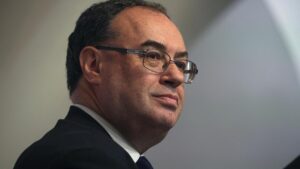
The economy is at a greater risk of falling into a recession in the year ahead as investors expect interest rates to rise to the highest level since 2000 in an effort to quell inflation.
The Bank of England sprang a surprise with a bumper half-point interest rate rise, with financial markets expecting at least three more increases before the end of the year to force down inflation. Money markets expect borrowing costs to peak at 6.1 per cent by the end of the year, a level of tightening economists warned would risk plunging the economy into a downturn.
George Buckley, chief UK economist at Nomura, said there was now a “bigger risk that, in the words of Milton Friedman, the Bank ends up being the ‘fool in the shower’ and hikes too much, requiring a swift correction should recession ensue”.
Andrew Bailey, governor of the Bank, said that the aggressive action against inflation was not designed to “precipitate a recession . . . We’ve got an economy that is much stronger and more resilient than we expected it to be. Part of that is because energy prices have come down so much, which is good news. So we’re not expecting and we’re not desiring a recession. But we will do what is necessary to bring inflation down to target.”
The Bank’s ratesetting monetary policy committee warned that inflation would not come down as rapidly as it has surged in the past year, as wage growth and the prices of goods and services had risen far more than the Bank had expected in recent months.
Bailey has come under fire from critics for being too sanguine over the risks that high inflation could become embedded in the economy. The Bank’s base rate has been lifted from 0.1 per cent to 5 per cent over the past 17 months.
There was a muted market reaction to the interest rate decision, with UK government bond prices falling slightly and the pound losing 0.2 per cent against the dollar to hit $1.27. Gilts become less attractive for bondholders in an environment of rising interest rates, as high inflation reduces the real value of coupons for investors.
The FTSE 100 closed down 57.15 points, or 0.8 per cent, at 7,502.03 and the FTSE 250, which is a better reflection of the UK economy, fell by 1.3 per cent, or 243.48 points, to 18,327.97.
Lee Hardman, currency analyst at MUFG, the Japanese bank, said the pound could weaken further if the country’s growth prospects darkened. Britain has avoided falling into a recession this year, but is barely generating growth above 0 per cent. If growth did hold up and the dollar continued to weaken, the pound could touch $1.30 this year, Hardman said.
There are tentative signs that inflationary pressures are beginning to subside and the economy is slowing. A measure of producer prices inflation slipped to the lowest level in two years last month, suggesting that business costs were no longer rising at a rapid pace. There is also evidence that banks and lenders are beginning to tighten up on consumer credit and households have begun to exhaust savings built up during the pandemic.
Read more:
Recession fears mount after rate rise





